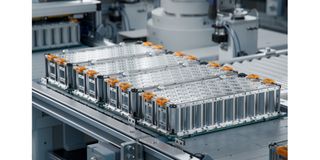Prime
Tanzania poised to capitalise on global battery supply chain, says new report

What you need to know:
- According to the findings, countries like Tanzania could produce batteries at costs comparable to Europe by 2030
Dar es Salaam. Tanzania is emerging as a key player in the global battery supply chain, with growing opportunities to refine critical minerals and manufacture batteries competitively.
A new report launched by UK Foreign Secretary, David Lammy in Lagos, outlines Africa's potential to transition from being a mere extractor of raw materials to a significant player in the refining and manufacturing of batteries.
The report, titled ‘From Minerals to Manufacturing: Africa’s Competitiveness in Global Battery Supply Chains’, highlights Tanzania’s competitive advantage in the global battery market, alongside other African nations such as Morocco.
The report, produced under the UK’s Manufacturing Africa programme in partnership with the Faraday Institution, identifies cost-competitive investment opportunities across the battery value chain in Africa.
According to the findings, countries like Tanzania could produce batteries at costs comparable to Europe by 2030.
Specifically, Tanzania is projected to achieve a production cost of $68 per kilowatt-hour (kWh), competitive with European prices, despite the continent's production benefiting from subsidies.
According to the report, the African continent holds a strategic position in the global supply of key minerals used in battery production, such as lithium, nickel, manganese, and copper.
These minerals, many of which are found in abundance in Tanzania, form the backbone of the growing electric vehicle (EV) and renewable energy industries worldwide.
By refining these minerals locally, Africa could achieve up to 40 percent greater competitiveness in the global market by 2030, potentially adding $6.8 billion in annual revenues to the continent’s economy and creating around 3,500 quality jobs in the battery supply chain.
Tanzania’s role in the global battery market has been further emphasised by the country’s efforts to develop the necessary infrastructure to support battery production.
The report highlights Tanzania’s ambitions in refining graphite and establishing a battery anode manufacturing facility.
Tanzania has been actively exploring opportunities in the battery supply chain, including a study into the production of spherical graphite (SGP), a critical component used in battery anodes.
According to the report, Africa as a whole has immense potential to meet global demand for batteries, which is expected to surge as the world shifts toward renewable energy and electric vehicles.
However, for African countries like Tanzania to fully capitalise on this potential, the report stresses the need for the right investment and policy environment, as well as improvements in infrastructure and workforce development.
Director for Economic Development and Partnerships at the UK Foreign, Commonwealth and Development Office (FCDO), Helen King, emphasised the importance of Africa’s transition from being just a raw materials exporter to a key manufacturer of batteries.
“This report shows that investors should give serious consideration to Africa’s potential as a future manufacturer of batteries, not just a buyer. This sector presents real opportunities for African growth and jobs,” she stated.
The potential for Tanzania to contribute to the global battery supply chain is not just about raw materials.
The country’s strategy includes leveraging its mineral resources to develop battery packs, battery assembly, and even recycling capabilities.
This comprehensive approach could help reduce production costs across the supply chain and create additional jobs in the region.
The report also calls for greater collaboration between African governments, investors, and international stakeholders to harness this opportunity.
“Given the abundance of critical natural minerals in Africa, African nations could play a significant role in the global battery supply chain,” said CEO of the Faraday Institution, Prof Martin Freer.
In addition to Tanzania, Morocco is also highlighted in the report as a country with strong potential for battery production.
Morocco could achieve production costs of $72/kWh, putting it on par with European costs, thanks to the country’s competitive edge in refining minerals and an attractive investment environment.





